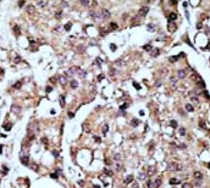ARG54819
anti-ATG4C antibody
anti-ATG4C antibody for IHC-Formalin-fixed paraffin-embedded sections,Western blot and Human,Mouse
Cancer antibody; Cell Biology and Cellular Response antibody; Cell Death antibody; Metabolism antibody
Overview
| Product Description | Rabbit Polyclonal antibody recognizes ATG4C |
|---|---|
| Tested Reactivity | Hu, Ms |
| Tested Application | IHC-P, WB |
| Host | Rabbit |
| Clonality | Polyclonal |
| Isotype | IgG |
| Target Name | ATG4C |
| Antigen Species | Human |
| Immunogen | KLH-conjugated synthetic peptide corresponding to aa. 419-448 (C-terminus) of Human ATG4C. |
| Conjugation | Un-conjugated |
| Alternate Names | Cysteine protease ATG4C; Autophagin-3; AUT-like 3 cysteine endopeptidase; Autophagy-related protein 4 homolog C; APG4C; APG4-C; Autophagy-related cysteine endopeptidase 3; EC 3.4.22.-; AUTL3; AUTL1 |
Application Instructions
| Application Suggestion |
|
||||||
|---|---|---|---|---|---|---|---|
| Application Note | * The dilutions indicate recommended starting dilutions and the optimal dilutions or concentrations should be determined by the scientist. | ||||||
| Positive Control | Mouse liver |
Properties
| Form | Liquid |
|---|---|
| Purification | This antibody is prepared by Saturated Ammonium Sulfate (SAS) precipitation followed by dialysis against PBS. |
| Buffer | PBS and 0.09% (W/V) Sodium azide |
| Preservative | 0.09% (W/V) Sodium azide |
| Storage Instruction | For continuous use, store undiluted antibody at 2-8°C for up to a week. For long-term storage, aliquot and store at -20°C or below. Storage in frost free freezers is not recommended. Avoid repeated freeze/thaw cycles. Suggest spin the vial prior to opening. The antibody solution should be gently mixed before use. |
| Note | For laboratory research only, not for drug, diagnostic or other use. |
Bioinformation
| Database Links | |
|---|---|
| Gene Symbol | ATG4C |
| Gene Full Name | autophagy related 4C, cysteine peptidase |
| Background | Autophagy is the process by which endogenous proteins and damaged organelles are destroyed intracellularly. Autophagy is postulated to be essential for cell homeostasis and cell remodeling during differentiation, metamorphosis, non-apoptotic cell death, and aging. Reduced levels of autophagy have been described in some malignant tumors, and a role for autophagy in controlling the unregulated cell growth linked to cancer has been proposed. This gene encodes a member of the autophagin protein family. The encoded protein is also designated as a member of the C-54 family of cysteine proteases. Alternate transcriptional splice variants, encoding the same protein, have been characterized. [provided by RefSeq, Jul 2008] |
| Function | Cysteine protease required for the cytoplasm to vacuole transport (Cvt) and autophagy. Is not essential for autophagy development under normal conditions but is required for a proper autophagic response under stressful conditions such as prolonged starvation (By similarity). Cleaves the C-terminal amino acid of ATG8 family proteins MAP1LC3 and GABARAPL2, to reveal a C-terminal glycine. Exposure of the glycine at the C-terminus is essential for ATG8 proteins conjugation to phosphatidylethanolamine (PE) and insertion to membranes, which is necessary for autophagy. Has also an activity of delipidating enzyme for the PE-conjugated forms. [UniProt] |
| Cellular Localization | Cytoplasm. |
| Research Area | Cancer antibody; Cell Biology and Cellular Response antibody; Cell Death antibody; Metabolism antibody |
| Calculated MW | 52 kDa |
Images (2) Click the Picture to Zoom In
-
ARG54819 anti-ATG4C antibody IHC-P image
Immunohistochemistry: Formalin-fixed and paraffin-embedded Human cancer tissue stained with ARG54819 anti-ATG4C antibody.
-
ARG54819 anti-ATG4C antibody WB image
Western blot: 35 µg of Mouse liver lysate stained with ARG54819 anti-ATG4C antibody at 1:1000 dilution.







